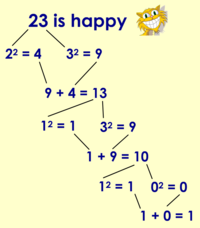A while ago I stumbled upon Happy Numbers as explained in programming praxis, and offered an implementation of them in SQL and in Emacs Lisp. Yeah, I know. Why not, though?
Today I’m back on that topic and as I’m toying with Common Lisp I though it would be a good excuse to learn me some new tricks. As you can see from the earlier blog entry, last time I did attack the digits problem quite lightly.

